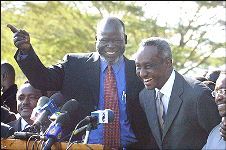Sudan govt, southern rebels pledge peace accord
By Evelyn Leopold
NAIROBI, Nov 18 (Reuters) – Sudan’s government and southern rebels promised on Thursday to complete a peace accord as soon as possible to end a 21-year-old civil war and resolve reconciliation efforts dogged by innumerable delays.

|
|
SPLM/A Chairman John Garang with Sudan Vice President Ali Osman Taha during a press conference after the signing of the peace accords in Naivasha, May 27, 2004 . |
Sudan’s vice president, Ali Osman Taha, and Sudan People’s Liberation Movement leader John Garang made the pledges in separate speeches to the U.N. Security Council, holding its first meeting away from New York in 14 years in order to seal the accord.
The United States, which organized the meeting in Nairobi, had expected the two warring parties in the oil-producing south of Africa’s biggest country to finish negotiations on the deal by the time the 15-member body arrived.
They now expect the two to agree a memorandum of understanding in front of the council on Friday, giving a December 31 deadline for completing the peace pact, which would radically restructure the Sudan government. The deal has been some two years in the making.
Garang was clear in saying that he saw no obstacle in completing the accord by the end of the year, although he said Khartoum had to agree to pay for his armed forces before and during their integration in a national army.
“Peace has a price and we are prepared to pay that price,” he told the council.
Taha did not give a Dec. 31 date in his speech and stressed his impoverished country needed $1.8 billion in development aid. But British officials said they expected Taha or a representative to sign the memorandum with the Dec. 31 date.
The council’s credibility is very much at stake should a north-south agreement not be reached soon. Six preliminary agreements have been signed on sharing power, integrating the military, and dividing oil revenues. Garang is to be a vice president in Khartoum, along with Taha.
At the same time the Security Council is under fire from humanitarian groups for not ending atrocities in Sudan’s western Darfur region. But Russia, China, Pakistan and Algeria are hesitant to provoke Khartoum by imposing U.N. sanctions.
More than 1.5 million people, mainly African villagers, have been left homeless by rampaging Janjaweed militia and Sudanese security forces. Thousands have been killed and rape is rampant.
The council’s visit to Nairobi is very much a U.S. affair. U.S. Ambassador John Danforth, once the Bush administration’s envoy to the north-south talks, initiated the visit as this month’s council president and supplied ambassadors and reporters with an aircraft normally used by Vice President Dick Cheney.
President Bush on Tuesday telephoned Sudanese President Omar al-Bashir and rebel leader Garang to give a further push to the peace process.
The council intends to adopt a resolution on Sudan on Friday, attach the Khartoum/SPLM memorandum to it and encourage the European Union, the World Bank and the United Nations to come up with plans for rebuilding the country once a north-south peace deal is signed.
Britain has pledged 100 million pounds ($180 million) next year. But a British official said it would be impossible to give that level of development aid “if conflict continues in Darfur, as any money available would be tied up on emergency relief.”
The United States has not released any aid numbers yet but Danforth made clear that “the world is not going to be there if they conclude a north-south peace agreement and then the next day start bombing villages in Darfur.”
In the past 21 years, 2 million people, mostly civilians, have died in the south from violence, disease or famine in a region rich in oil.
The SPLM is composed mainly of African animists and Christians, but throughout the country there are hundreds of ethnic and tribal divisions and language groups.
